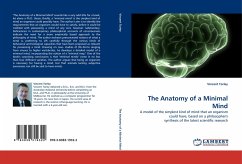"The Anatomy of a Minimal Mind" sounds like a very odd title for a book, let alone a Ph.D. thesis. Briefly, a "minimal mind" is the simplest kind of mind an organism could possibly have. The author's aim is to identify the requirements that an organism would have to satisfy, before it could be credited with possessing a mind of any sort, however rudimentary. Deficiencies in contemporary philosophical accounts of consciousness indicate the need for a more empirically based approach to the philosophy of mind. The author eschews preconceived notions of what a mind is, preferring to sift carefully through the various kinds of behavioral and biological capacities that have been proposed as relevant for possessing a mind. Drawing on case- studies of life-forms ranging from viruses to higher vertebrates, he develops a detailed model of a minimal mind, incorporating the notion of a "minimal map." One of the book's surprising conclusions is that "minimal minds" come in no less than four different varieties. The author argues that being an organism is necessary for having a mind, but that animals lacking subjective awareness can still be said to have minds.
Bitte wählen Sie Ihr Anliegen aus.
Rechnungen
Retourenschein anfordern
Bestellstatus
Storno








